新概念英语第二册 Lesson 86 Out of control 课件 (共67张PPT)
文档属性
| 名称 | 新概念英语第二册 Lesson 86 Out of control 课件 (共67张PPT) |  | |
| 格式 | pptx | ||
| 文件大小 | 14.8MB | ||
| 资源类型 | 教案 | ||
| 版本资源 | 新概念英语 | ||
| 科目 | 英语 | ||
| 更新时间 | 2024-02-19 15:40:15 | ||
图片预览

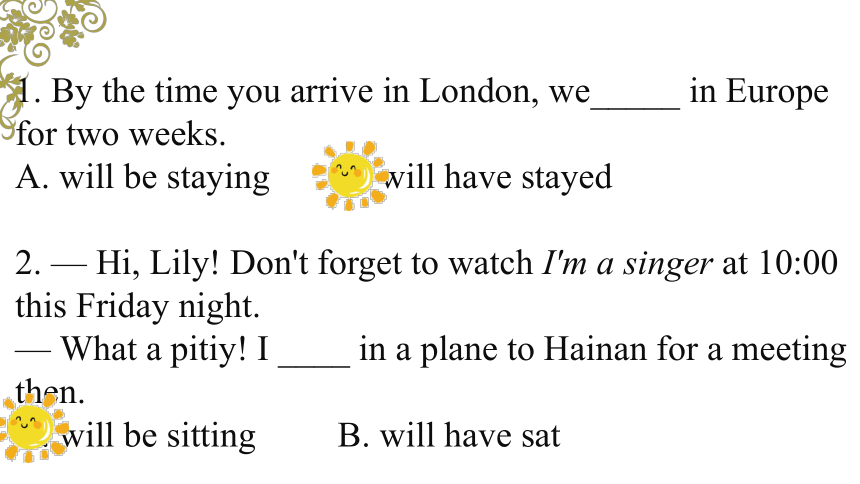
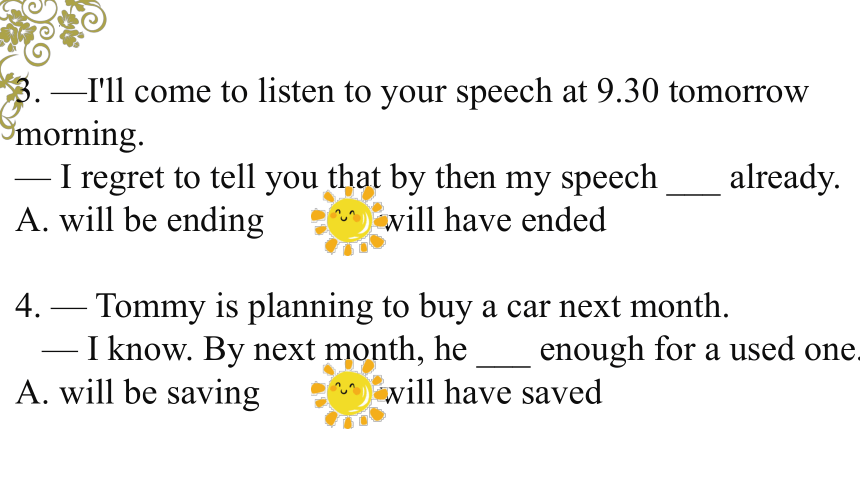
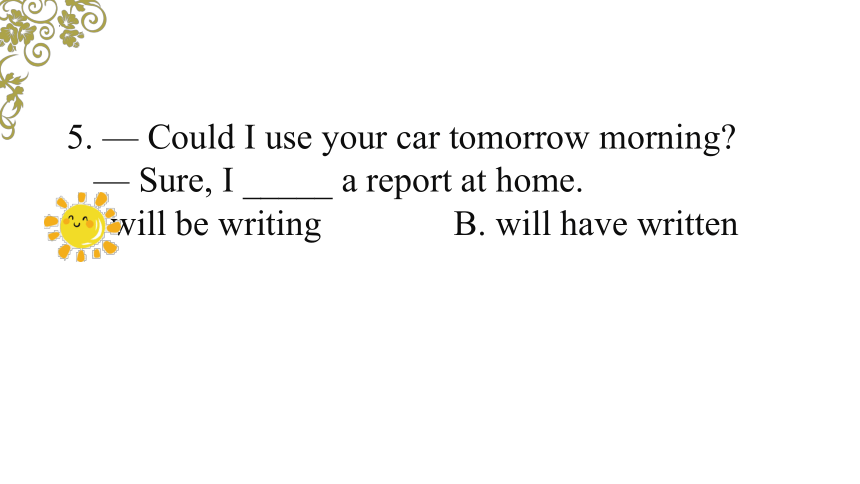



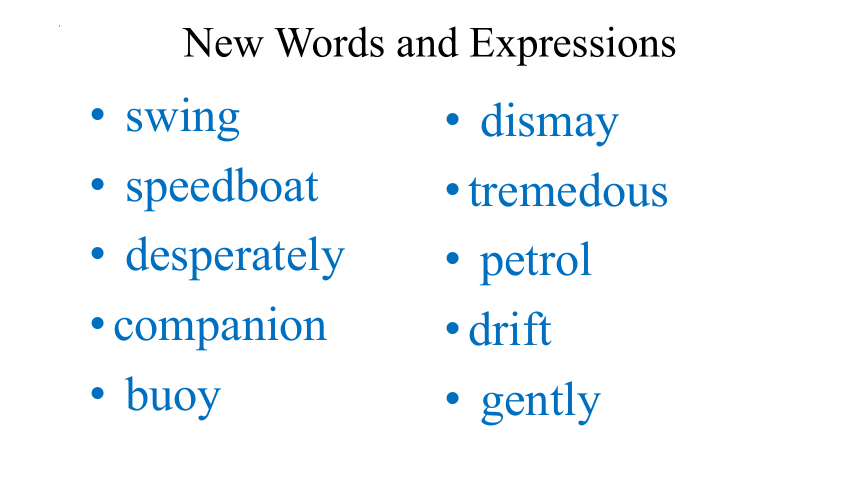
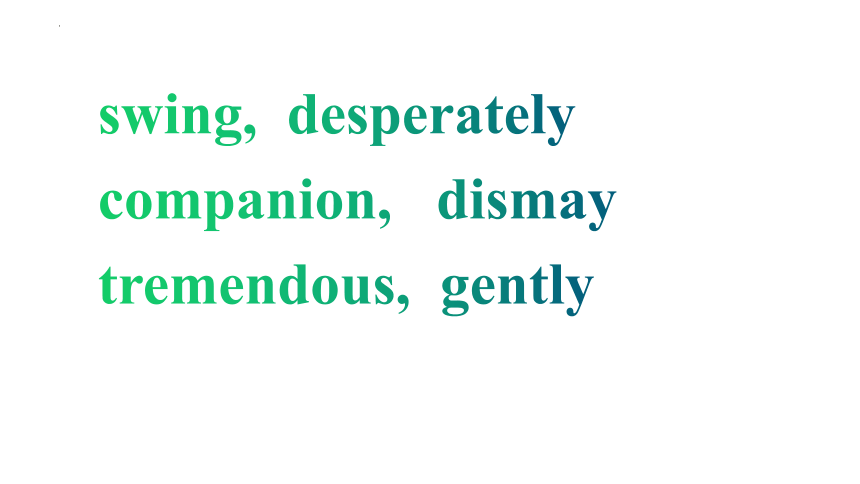

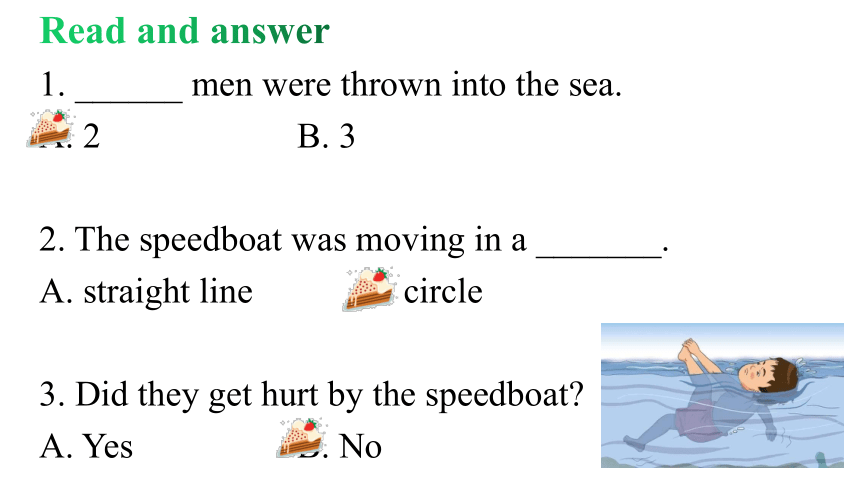

文档简介
(共67张PPT)
Daily Proverb
The best accessory a girl can own
is confidence.
女生最好的饰品就是自信。
1. By the time you arrive in London, we_____ in Europe
for two weeks.
A. will be staying B. will have stayed
2. — Hi, Lily! Don't forget to watch I'm a singer at 10:00
this Friday night.
— What a pitiy! I ____ in a plane to Hainan for a meeting
then.
A. will be sitting B. will have sat
3. —I'll come to listen to your speech at 9.30 tomorrow
morning.
— I regret to tell you that by then my speech ___ already.
A. will be ending B. will have ended
4. — Tommy is planning to buy a car next month.
— I know. By next month, he ___ enough for a used one.
A. will be saving B. will have saved
5. — Could I use your car tomorrow morning
— Sure, I _____ a report at home.
A. will be writing B. will have written
Lesson 86
Out of control
New words
1
Text
2
3
Grammar
Part 1
New words
New Words and Expressions
swing
speedboat
desperately
companion
buoy
dismay
tremedous
petrol
drift
gently
swing, desperately
companion, dismay
tremendous, gently
Part 2
Text
Read and answer
1. ______ men were thrown into the sea.
A. 2 B. 3
2. The speedboat was moving in a _______.
A. straight line B. circle
3. Did they get hurt by the speedboat
A. Yes B. No
Out of control
control
v. 控制
n. 控制
out of control
失控
可控
under control
1. As the man tried to swing the speedboat round, the steering wheel came away in his hands.
as
when
swing-swung-swung
v. 转向、突然转向、转变方向、转变思想
eg. 1. 汽车调转了方向。
A car swung round the corner.
eg. 2. I swung the bag on my back.
我把书包甩到了身后
swing
n. 摆动、振动
eg. 船的晃动让我感到想吐。
The swing of the ship makes me sick.
n.秋千
v. 摆动、使摆动
eg. 猴子在树上从这棵树荡到那棵树。
The monkey is swinging itself from tree to tree.
speedboat
a steering wheel
come away
脱落,离开
1. The paint came away from the wall.
2. One piece of paper came away from the book.
3. 一个按键从手机上脱落了。
A button came away from the cellphone.
2. He waved desperately to his companion, who had been water skiing for the last fifteen minutes.
desperately
adv. 非常;极其,拼命地;孤注一掷地
eg. 他极度地忙。
He was desperately busy.
desperate
adj. 不顾一切的、亡命的,非常的
eg. 亡命的小偷向警察开枪。
The desperate thief shot at the policeman.
2. 我特别想去国外学习。
eg. 1. 我特别想见他。
be desperate to do sth
3. He is desperate to pass the entrance exam.
极其渴望做...
I am desperate to see him.
I am desperate to study abroad.
3. 他特别想通过考试。
companion
n. 同伙,伙伴
忠诚的伙伴
faithful companion
一个终身的伴侣
a lifelong companion
n. 旅伴
company
3. Both men had hardly had time to realize what was happening when they were thrown violently into the sea.
hardly... when
as soon as
4. The speedboat had struck a buoy, but it continued to move very quickly across the water.
strike
strike-struck-struck
罢工
突然侵袭
碰撞;攻击
时钟)敲,鸣,报时
buoy
life buoy
5. Both men had just begun to swim towards the shore, when they noticed with dismay that the speedboat was moving in a circle.
dismay
n. 沮丧、惊慌、胆怯
沮丧地
with dismay
The supporters watched with dismay as their
team lost.
沮丧地看着
left with dismay
沮丧的离开
沮丧地说
I say something with dismay.
looked at with dismay
6. It now came straight towards them at tremendous speed.
huge. (A)
enormous. (E)
big
large
immense
giant
tremendous
adj. 惊人的、巨大的
eg. 1. 他以惊人的速度跑。
He ran at tremendous speed.
2. Your advice has been a tremendous help to us.
3. My new job will be a tremendous challenge.
4. She is making a tremendous effort.
抽象的物质
7. In less than a minute, it roared past them only a few feet away.
roar
v. 吼叫,咆哮
in less than a minute
不到1分钟
8. After it had passed, they swam on as quickly as they could because they knew that the boat would soon return.
v + on
继续做这个动作
hold on
go on
His spirit still lives on.
在...上面,关于
on
9. They had just had enough time to swim out of danger when the boat again completed a circle.
out of danger
脱离危险
10. On this occasion, however, it had slowed down considerably. The petrol had nearly all been used up.
occasion
n. 时刻,场合
on the occasion
在这种场合
on this occasion
这一回,此刻
1. I like chocolate, but on this occasion it is bad news.
2. I pass all kinds of exams. However, I failed on this occasion
我喜欢巧克力,但是这一次,这是个坏消息。
我可以通过任何考试,但是这一次我失败了。
consider
v. 认真考虑,斟酌
considerable
considerably
adj. 相当大的;相当多的
adv. 非常; 很; 相当多地
He has made considerable progress in his studies.
v+ up
光
use up
eat up
用光,耗尽
吃光
give up
放弃
cut up
切碎
11. Before long, the noise dropped completely and the boat began to drift gently across the water.
before long
soon
不久,很快
long before
long time ago
很久以前
1.__________ he fell ill and died.
2. _________, there was a big museum here.
Before long
Long before
swing
hardly...when
long before
speedboat
strike
a steering wheel
control
come away
desperate
violently
out of danger
considerable
tremendous
V+up
on this occasion
before long
dismay
less than a minute
roar
V +on
diamay, swing, companion, drift, desperate
1. The monkey held on to the rope and _______ across
the river.
2. He has a ___________ desire to succeed..
3. To my _________, this park was closed this morning.
4. He is a wonderful ________ and we can talk for hours.
5. The waves became rougher as they ________ out to sea.
swung
desperate
dismay
companion
drifted
Part 3
Grammar
1. Both men had hardly had time to realize what ...
2. The speedboat had struck a buoy, but it continued to ...
3. Both men had just begun to swim towards the shore
4. it had slowed down considerably
过去完成时
过去完成时
1. 定义:表示过去某一时间或动作以前已经发生或完成了的动作,侧重事情的结果。
1. They had just had enough time to swim out of
danger when the boat again completed a circle.
2. The children ran away after they had
broken the window.
2. 构成: had done
3. 时间标志词
by+ 过去时间
before+过去时间
过去完成时
no sooner...than
hardly...when
by 1998
by now
by 2050
过去完成时
现在完成时
将来完成时
eg. By the end of last term, we had learned 5000 new words.
一......就
no sooner...than
1. I had no sooner arrived home than the
telephone rang.
2. I had hardly arrived home when the telephone rang.
hardly...when
as soon as
1. I will tell you as soon as he comes.
2. I told him as soon as he came.
1. 我一出去,天就开始下雨了。
I had no sooner rushed out than it began to rain.
2. 他刚一跑出去,天就开始下雨了。
He had hardly rushed out when it began to rain.
4. 与一般过去时的区别
He had killed the monsters before his master came here.
过去完成时
1. I missed the train. It_____ the platform already when I got to the station.
A.would leave B.has left
C.is leaving D.had left
2. By the end of last month, I_____ half of the project.
A.finished B.have finished
C.had finished D.will finish
3. By the time I arried home, I realised that I_____ my key at my office.
A.have left B.had left
C.left D.was leaving
4. — Did you meet Tom at the airport
— No, he _____ by the time I _____ there
A.has left, got B.had left, arrived
C.left, arrived D.left, had got
5. The film _____ for five minutes when I got to the cinema.
A.has on B.has been on
C.has on D. had been on
6. — We all went to the cinema except you last night, why didn't you come
— Because I _____ that movie twice.
A.have watched B.had watched
C.was watching D.would watch
7. He ___ more than 5,000 English words when he entered the university at the age of 15.
A.has learned B.would have learned
C.learned D.had learned
8. The play had _ started when there was a power cut.
A.hard B. sooner
C.no sooner D. hardly
9. I had ___ got home than it began to rain.
A.just B.sooner
C.no sooner D.hardly
10. I had ___ got home when it began to rain.
A.just B. sooner
C.no sooner D. hard
3
Grammar
enough / fairly
enough表示“足够”,用在形容词或副词之后
我到车站到得不够早(我误了火车)。
I didn’t arrive at the station early enough.
fairly表示“相当”,通常修饰表示肯定意义的词
The water in the pool is fairly warm
1. It’s ____ cold today , but not really cold _____ to light a fire .
2. This book was ____ interesting , but I didn’t enjoy it as much as I expected to .
3. This class has given me ____ trouble so far .
4. Is that suitcase large ____ to take all these clothes ?
.
状语从句连词复习
时间连词:
before、after、when、while、as、since、till、until、once、as soon as
the moment ,the minute, the second, the instant, every time, each time, the last time, the first time
immediately, directly, instantly
no sooner…than…, hardly/scarcely… when…,
Scarcely had he gone when she appeared
区分:for the first time
状语从句连词复习
地点连词:
where,wherever
条件连词:
if, unless, as long as (=so long as只要) ,
in case (that) (以防万一;如果 )
on condition that (条件是,在…的条件下 )
if only (要是...多好 )
only if (只要)
supposing/ suppose(假设 )
状语从句连词复习
让步状语从句:
though, although, as, even if, even though, wh-ever, no matter wh-, whether
as引导让步状语从句时从句部分语序要部分倒装
Child as he was, he had to support the family.
原因状语从句:
because, as, since, now that (既然), considering that (考虑到,既然)
在强调句中强调原因状语从句,只能用because引导,不可用as或since.
since表示“既然”,只能放主句前.
状语从句连词复习
结果状语从句:
so…that… /such…that…
such/so…that…与such/so… as …
They have such a fierce dog _____ no one dares to go near their house.
that
They have so fierce a dog _____ bites whoever passes by their house.
as
This is such a heavy stone ____ I can’t lift.
This is such a heavy stone ____ I can’t lift it.
as
that
状语从句连词复习
目的状语从句:
so,so that,in order that, for fear that(以免,以防,惟恐)
谓语动词常与情态动词can,could,may,might,should,would连用
方式状语从句:
as (象….一样,正如), as if/as though (好象,宛如)
Leave it as it is.
事实上,按现在的样子
比较状语从句:
as….as (和…一样), not as/so…as (不如), than (比), the more…the more… (越…越…).
分词作状语
As he was ill, he went home.
Being ill , he went home.
As he didn’t know what to do , he asked me for help.
Not knowing what to do, he asked me for help.
The park looks very beautiful when it is seen from the hill.
Seen from the hill, the park looks very beautiful.
THANKS
Daily Proverb
The best accessory a girl can own
is confidence.
女生最好的饰品就是自信。
1. By the time you arrive in London, we_____ in Europe
for two weeks.
A. will be staying B. will have stayed
2. — Hi, Lily! Don't forget to watch I'm a singer at 10:00
this Friday night.
— What a pitiy! I ____ in a plane to Hainan for a meeting
then.
A. will be sitting B. will have sat
3. —I'll come to listen to your speech at 9.30 tomorrow
morning.
— I regret to tell you that by then my speech ___ already.
A. will be ending B. will have ended
4. — Tommy is planning to buy a car next month.
— I know. By next month, he ___ enough for a used one.
A. will be saving B. will have saved
5. — Could I use your car tomorrow morning
— Sure, I _____ a report at home.
A. will be writing B. will have written
Lesson 86
Out of control
New words
1
Text
2
3
Grammar
Part 1
New words
New Words and Expressions
swing
speedboat
desperately
companion
buoy
dismay
tremedous
petrol
drift
gently
swing, desperately
companion, dismay
tremendous, gently
Part 2
Text
Read and answer
1. ______ men were thrown into the sea.
A. 2 B. 3
2. The speedboat was moving in a _______.
A. straight line B. circle
3. Did they get hurt by the speedboat
A. Yes B. No
Out of control
control
v. 控制
n. 控制
out of control
失控
可控
under control
1. As the man tried to swing the speedboat round, the steering wheel came away in his hands.
as
when
swing-swung-swung
v. 转向、突然转向、转变方向、转变思想
eg. 1. 汽车调转了方向。
A car swung round the corner.
eg. 2. I swung the bag on my back.
我把书包甩到了身后
swing
n. 摆动、振动
eg. 船的晃动让我感到想吐。
The swing of the ship makes me sick.
n.秋千
v. 摆动、使摆动
eg. 猴子在树上从这棵树荡到那棵树。
The monkey is swinging itself from tree to tree.
speedboat
a steering wheel
come away
脱落,离开
1. The paint came away from the wall.
2. One piece of paper came away from the book.
3. 一个按键从手机上脱落了。
A button came away from the cellphone.
2. He waved desperately to his companion, who had been water skiing for the last fifteen minutes.
desperately
adv. 非常;极其,拼命地;孤注一掷地
eg. 他极度地忙。
He was desperately busy.
desperate
adj. 不顾一切的、亡命的,非常的
eg. 亡命的小偷向警察开枪。
The desperate thief shot at the policeman.
2. 我特别想去国外学习。
eg. 1. 我特别想见他。
be desperate to do sth
3. He is desperate to pass the entrance exam.
极其渴望做...
I am desperate to see him.
I am desperate to study abroad.
3. 他特别想通过考试。
companion
n. 同伙,伙伴
忠诚的伙伴
faithful companion
一个终身的伴侣
a lifelong companion
n. 旅伴
company
3. Both men had hardly had time to realize what was happening when they were thrown violently into the sea.
hardly... when
as soon as
4. The speedboat had struck a buoy, but it continued to move very quickly across the water.
strike
strike-struck-struck
罢工
突然侵袭
碰撞;攻击
时钟)敲,鸣,报时
buoy
life buoy
5. Both men had just begun to swim towards the shore, when they noticed with dismay that the speedboat was moving in a circle.
dismay
n. 沮丧、惊慌、胆怯
沮丧地
with dismay
The supporters watched with dismay as their
team lost.
沮丧地看着
left with dismay
沮丧的离开
沮丧地说
I say something with dismay.
looked at with dismay
6. It now came straight towards them at tremendous speed.
huge. (A)
enormous. (E)
big
large
immense
giant
tremendous
adj. 惊人的、巨大的
eg. 1. 他以惊人的速度跑。
He ran at tremendous speed.
2. Your advice has been a tremendous help to us.
3. My new job will be a tremendous challenge.
4. She is making a tremendous effort.
抽象的物质
7. In less than a minute, it roared past them only a few feet away.
roar
v. 吼叫,咆哮
in less than a minute
不到1分钟
8. After it had passed, they swam on as quickly as they could because they knew that the boat would soon return.
v + on
继续做这个动作
hold on
go on
His spirit still lives on.
在...上面,关于
on
9. They had just had enough time to swim out of danger when the boat again completed a circle.
out of danger
脱离危险
10. On this occasion, however, it had slowed down considerably. The petrol had nearly all been used up.
occasion
n. 时刻,场合
on the occasion
在这种场合
on this occasion
这一回,此刻
1. I like chocolate, but on this occasion it is bad news.
2. I pass all kinds of exams. However, I failed on this occasion
我喜欢巧克力,但是这一次,这是个坏消息。
我可以通过任何考试,但是这一次我失败了。
consider
v. 认真考虑,斟酌
considerable
considerably
adj. 相当大的;相当多的
adv. 非常; 很; 相当多地
He has made considerable progress in his studies.
v+ up
光
use up
eat up
用光,耗尽
吃光
give up
放弃
cut up
切碎
11. Before long, the noise dropped completely and the boat began to drift gently across the water.
before long
soon
不久,很快
long before
long time ago
很久以前
1.__________ he fell ill and died.
2. _________, there was a big museum here.
Before long
Long before
swing
hardly...when
long before
speedboat
strike
a steering wheel
control
come away
desperate
violently
out of danger
considerable
tremendous
V+up
on this occasion
before long
dismay
less than a minute
roar
V +on
diamay, swing, companion, drift, desperate
1. The monkey held on to the rope and _______ across
the river.
2. He has a ___________ desire to succeed..
3. To my _________, this park was closed this morning.
4. He is a wonderful ________ and we can talk for hours.
5. The waves became rougher as they ________ out to sea.
swung
desperate
dismay
companion
drifted
Part 3
Grammar
1. Both men had hardly had time to realize what ...
2. The speedboat had struck a buoy, but it continued to ...
3. Both men had just begun to swim towards the shore
4. it had slowed down considerably
过去完成时
过去完成时
1. 定义:表示过去某一时间或动作以前已经发生或完成了的动作,侧重事情的结果。
1. They had just had enough time to swim out of
danger when the boat again completed a circle.
2. The children ran away after they had
broken the window.
2. 构成: had done
3. 时间标志词
by+ 过去时间
before+过去时间
过去完成时
no sooner...than
hardly...when
by 1998
by now
by 2050
过去完成时
现在完成时
将来完成时
eg. By the end of last term, we had learned 5000 new words.
一......就
no sooner...than
1. I had no sooner arrived home than the
telephone rang.
2. I had hardly arrived home when the telephone rang.
hardly...when
as soon as
1. I will tell you as soon as he comes.
2. I told him as soon as he came.
1. 我一出去,天就开始下雨了。
I had no sooner rushed out than it began to rain.
2. 他刚一跑出去,天就开始下雨了。
He had hardly rushed out when it began to rain.
4. 与一般过去时的区别
He had killed the monsters before his master came here.
过去完成时
1. I missed the train. It_____ the platform already when I got to the station.
A.would leave B.has left
C.is leaving D.had left
2. By the end of last month, I_____ half of the project.
A.finished B.have finished
C.had finished D.will finish
3. By the time I arried home, I realised that I_____ my key at my office.
A.have left B.had left
C.left D.was leaving
4. — Did you meet Tom at the airport
— No, he _____ by the time I _____ there
A.has left, got B.had left, arrived
C.left, arrived D.left, had got
5. The film _____ for five minutes when I got to the cinema.
A.has on B.has been on
C.has on D. had been on
6. — We all went to the cinema except you last night, why didn't you come
— Because I _____ that movie twice.
A.have watched B.had watched
C.was watching D.would watch
7. He ___ more than 5,000 English words when he entered the university at the age of 15.
A.has learned B.would have learned
C.learned D.had learned
8. The play had _ started when there was a power cut.
A.hard B. sooner
C.no sooner D. hardly
9. I had ___ got home than it began to rain.
A.just B.sooner
C.no sooner D.hardly
10. I had ___ got home when it began to rain.
A.just B. sooner
C.no sooner D. hard
3
Grammar
enough / fairly
enough表示“足够”,用在形容词或副词之后
我到车站到得不够早(我误了火车)。
I didn’t arrive at the station early enough.
fairly表示“相当”,通常修饰表示肯定意义的词
The water in the pool is fairly warm
1. It’s ____ cold today , but not really cold _____ to light a fire .
2. This book was ____ interesting , but I didn’t enjoy it as much as I expected to .
3. This class has given me ____ trouble so far .
4. Is that suitcase large ____ to take all these clothes ?
.
状语从句连词复习
时间连词:
before、after、when、while、as、since、till、until、once、as soon as
the moment ,the minute, the second, the instant, every time, each time, the last time, the first time
immediately, directly, instantly
no sooner…than…, hardly/scarcely… when…,
Scarcely had he gone when she appeared
区分:for the first time
状语从句连词复习
地点连词:
where,wherever
条件连词:
if, unless, as long as (=so long as只要) ,
in case (that) (以防万一;如果 )
on condition that (条件是,在…的条件下 )
if only (要是...多好 )
only if (只要)
supposing/ suppose(假设 )
状语从句连词复习
让步状语从句:
though, although, as, even if, even though, wh-ever, no matter wh-, whether
as引导让步状语从句时从句部分语序要部分倒装
Child as he was, he had to support the family.
原因状语从句:
because, as, since, now that (既然), considering that (考虑到,既然)
在强调句中强调原因状语从句,只能用because引导,不可用as或since.
since表示“既然”,只能放主句前.
状语从句连词复习
结果状语从句:
so…that… /such…that…
such/so…that…与such/so… as …
They have such a fierce dog _____ no one dares to go near their house.
that
They have so fierce a dog _____ bites whoever passes by their house.
as
This is such a heavy stone ____ I can’t lift.
This is such a heavy stone ____ I can’t lift it.
as
that
状语从句连词复习
目的状语从句:
so,so that,in order that, for fear that(以免,以防,惟恐)
谓语动词常与情态动词can,could,may,might,should,would连用
方式状语从句:
as (象….一样,正如), as if/as though (好象,宛如)
Leave it as it is.
事实上,按现在的样子
比较状语从句:
as….as (和…一样), not as/so…as (不如), than (比), the more…the more… (越…越…).
分词作状语
As he was ill, he went home.
Being ill , he went home.
As he didn’t know what to do , he asked me for help.
Not knowing what to do, he asked me for help.
The park looks very beautiful when it is seen from the hill.
Seen from the hill, the park looks very beautiful.
THANKS
同课章节目录
